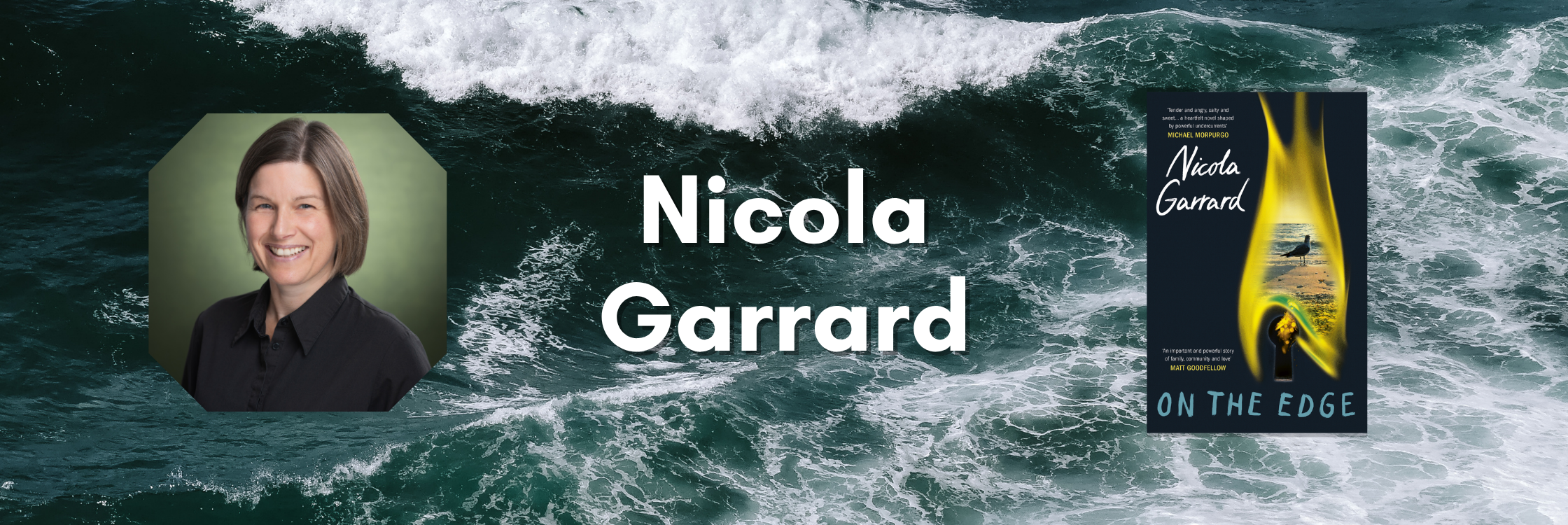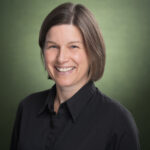In our Campfire Chats we talk to some wonderful authors about their books, life and Camp spirit! We surfing over to South Devon where we meet Rhys and his two brothers and chat to amazing teacher and author Nicola Garrard about her book On the Edge. Which is YA / crossover novel that explores how young people’s futures are built – and defended – on shifting and uneven ground, where tides of tourism, gentrification and second-home ownership erode the traditional ways of life and financial stability of locals. Beautifully drawn characters, lyrical depictions of the natural landscape, brotherly love, family loyalty – and surfing. A powerful and thought-provoking read.
The surfing in On the Edge felt so real. Do you surf IRL or was it all imagination?
I do surf! But I’m a bit of a scaredy-cat to be honest. My older brother is the wild one, he rides huge waves and turns up to his job soaked in seawater! I used to drive from work on Fridays to see him on the coast and get a free surf lesson. I could honestly spend hours out there. Surfing is addictive!
The 17yo hero of On the Edge, Rhys is a Young Carer juggling so much. Was that something you really wanted to highlight in the book?
Absolutely. I’ve taught loads of young people who are carers, who looking after siblings, grandparents, even their own parents. They’re expected to act like adults but get none of the credit. I want readers to see young carers’ strength and how much they give, often with no recognition at all. Rhys is for them.
Do you think Rhys was failed by his school?
Yes, and unfortunately, that’s really common. I’ve seen so many students, especially working-class boys, get left behind in schools that aren’t built for them. One student of mine did all the cooking and house chores and got his uniform ready, because his dad worked really long hours. He got detentions for forgetting things like homework when other people have parents at home reminding them and checking up. He was bright, determined and holding everything together. Instead of being supported, he was punished and given a bad name. It’s heartbreaking.
You explore a side of seaside towns that tourists never see. What inspired that?
People think of places like Devon and Cornwall as sunny holiday escapes, but if you live there, it can be a very different story. Families are pushed out of their homes during tourist season, there’s not enough healthcare, public transport or decent housing. Also, behind the scenes, a lot of young people are being exploited to deal drugs to tourists. No one talks about it, but it’s real, and I wanted to shine a light on that.
Your first book 29 Locks was so powerful. What made you write it?
After one of my amazing students, Mahad Ali, was murdered, and barely mentioned in the news, I was furious. He was kind, funny, loyal but not the kind of teen the media cares about. I wanted to write something that showed the real lives of young people growing up in London – their jokes, struggles, love for family – and the injustices they face. 29 Locks was my way of saying: London kids matter and they are amazing!
You often write about boys who feel left out or overlooked. Why them?
I’ve spent most of my teaching career with boys from tough backgrounds. And honestly? I love them. They’re loud, full of energy and get into trouble, but they’re also caring, thoughtful and emotional. The world often paints teenage boys as dangerous or out of control – and yes, they can make mistakes – but they’re also deeply loyal, protective and kind. I want readers to see all of that.
You work with a charity called Minority Matters – tell us what that’s about.
Minority Matters is a small charity in London working to stop child criminal exploitation. I help run tutoring for boys who’ve been excluded from school, and we also work with families who’ve been through serious trauma, including parents whose children have been murdered or are victims of knife violence. We also host an annual conference where families can speak directly to police, teachers, social workers and the council. I’m pushing for big changes in how we help young people caught up in knife crime and drugs.
Do you plan your books out or just go with the flow?
A bit of both! Sometimes I scribble random scenes or poems until something clicks. Both 29 Locks and On the Edge started out as poems! I’m massively inspired by nature, the sea, animals, countryside vibes. I think adults often underestimate how much young people connect with nature, but I see it all the time with my students. However I start, I always rewrite a lot. I treat every sentence like a poem.
Book recs time! What’s on your TBR right now and what YA should we all be reading?
A: I’m reading Catherine Johnson’s Blood and Bone right now. It’s brilliant and makes me want to visit Paris and learn more about the French Revolution. I love books that send me down a rabbit hole looking up the background history. I love YA! I read massive amounts of it every year – upwards of 40 novels! My favourite YA novels are quirky, intelligent and have something political to say. Most recently I loved Finding Phoebe by Gavin Extence, Eddy, Eddy by Kate Di Goldi, Little Bang by Kelly McCaughrain, You Could Be So Pretty by Holly Bourne, which has seriously powerful feminist vibes. And if you’re looking for something laugh-out-loud funny, try anything by Nathanael Lessore – Steady for This, King of Nothing, What Happens Online. I’ve tested them with my own teenagers at home and in the classroom – total hits.
Quickfire Camp Round:
What activity would you most look forward to doing at Camp?
As well as being a writer, I’m also a teacher. The best bit of my job is taking teenagers on camping holidays. My favourite camp activity is Talent Show night, where my students perform original raps, poems, stories, songs and comedy sketches around the campfire and cheer each other on.
What book would you take with you?
I’d want to take something scary, and read it by torchlight. Maybe Kalynn Bayron’s You’re Not Supposed to Die Tonight which is set in a summer camp in the creepy woods of upstate New York.
What is your favourite camp snack?
I’m going cowgirl on this one. Baked potatoes – cooked in tinfoil in the campfire – slathered in butter and baked beans.
On the Edge is published by Old Barn Books in the UK.
Thank you to Nicola Garrard for answering our questions!



